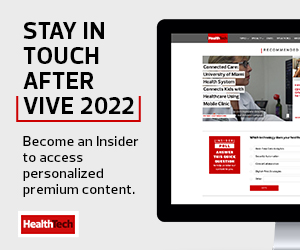The COVID-19 pandemic accelerated many business and technology approaches in healthcare, yet providers also faced financial burdens in a sector with already razor-thin margins.
Patient expectations keep evolving, and healthcare consumerization will continue to shape organizations’ approaches to care delivery toward seamless integration and convenience.
So how can healthcare systems face this changing landscape with renewed confidence in their business and technology strategies? The experts at three ViVE sessions explained.
Click the banner below for access to exclusive HealthTech content and a customized experience.
1. Deliberate Partnering in a Fast-Paced World
Partnerships have different flavors, and healthcare organizations need to think about different approaches and models that will help them find success, said Aimee Quirk, CEO of Ochsner Ventures at Louisiana-based Ochsner Health.
“Buying can be a full-on business acquisition, but I think of it sometimes as a vendor relationship because it doesn’t really involve what I think of as partnership, which is where there’s a shared risk in the outcome, the ups and the downs, full-on risk. A lot of times, that involves co-development,” she said.
If healthcare organizations are deciding whether to buy a solution off the shelf or partner, they need to think about whether they’re ready to build trust and transparency of communication over time, Quirk added. And clarity on the “give-get,” what the organization and what the partner will receive, needs to be established at the very start.
Moderator Nick Dougherty (far right), Vice President of Digital Innovation at AllWays Health Partners, a member of Mass General Brigham, addresses the audience during the session “To Buy, To Build or To Partner? That’s the Strategic Question.” The panelists, from left to right, are Aimee Quirk, CEO of Ochsner Ventures, Ochsner Health; John Bass, Founder and CEO of Hashed Health; Liz Rockett, Managing Director of Kaiser Permanente Ventures; and Michelle Snyder, Partner at McKesson Ventures.
McKesson Ventures Partner Michelle Snyder shared her experience in digital health in the late 1990s, trying to get doctors to use PalmPilots. Digital health has been developing for decades, and now the industry is seeing a maturation amid improved technology and explosive demand. With this accelerated landscape, it doesn’t always make sense to build a solution in-house. Partnerships will help organizations keep pace; after all, healthcare is a team sport.
“The world is moving faster now, and we have to be able to move faster too,” Snyder said.
MORE FROM VIVE: Learn how healthcare can maintain digital health success into 2022.
2. Identifying the ‘Small Story’ along with the ‘Big Story’
Healthcare organizations looking to focus their impact and scale after working with hundreds of companies need to find partners with a “small story and big story,” said Aaron Martin, executive vice president and chief digital officer of Providence.
“Your small story is how you are going to generate an awesome ROI for us in a very short period of time,” Martin said. “It’s the problem that we really care about that we’ve got to get fixed now. And then the big story is, how does this become more than that small story over time?”
From left to right: Moderator Chitra Nawbatt, Global Head of Health Assurance Partnerships at General Catalyst, addresses the crowd during the session “Forget the Money, Show me the ROI!” Listening are panelists Aaron Martin, Executive Vice President and Chief Digital Officer at Providence; Snezana Mahon, Chief Operating Officer of Transcarent; Dr. Neal Patel, CIO of Vanderbilt University Medical Center; and Tressa Springmann, Senior Vice President and Chief Information and Digital Officer of LifeBridge Health.
Martin shared about an early investment into a small company that had a “small story” about enabling call centers with physician data that generated major ROI. Its big story was sharing that accurate data through different platforms and partners.
He added, “If you look at a theme of the almost 30 companies that we’ve invested in, all of them have that big story. They’re all going somewhere.”
EXPLORE: 5 questions to ask for effective healthcare IT change management.
3. Moving Toward Provider-Payer Alignment
Revenue cycle management is a complex process that can seem like it puts healthcare providers and payers in adversarial positions. Friction does exist, said Tamara Ward, senior vice president of insurance business operations at New York-based payer Oscar Health, but it doesn’t have to.
“I’ve been on both sides, both the provider and the payer sides,” Ward said, “I think it really boils down to a few things: leveraging the data and technology that we have to work together, but more importantly, understanding that we are anchored around a common mission.”
From left to right: Tamara Ward, Senior Vice President of Insurance Business Operations at Oscar Health, speaks during the session “The Revenue Cycle Management Matrix: Choose the Red Pill” as panelists Jacob Shiff, Co-Founder and CEO, Anomaly; Gina Kim, Chief Product Officer at Cohere Health; Jeb Dunkelberger, CEO of Sutter Health Aetna; and Sari Kaganoff, General Manager of Consulting at Rock Health, listen on.
Providers want to deliver important medical care, and payers — contrary to popular belief — do not wake up daily just to deny claims, Ward said. Oscar Health has built out its own electronic health record, and she described listening to connected providers to streamline workflows and eventually eliminate waste.
“If we can all focus on that notion that we both want to be equally efficient, but we both have to work together and come to the table to figure out how we create that efficiency by leveraging our tech assets that both organizations have, we can, over time, eliminate that friction,” Ward said.
Keep this page bookmarked for our ongoing virtual coverage of ViVE 2022, which takes place March 6-9, 2022, virtually and in person in Miami Beach, Fla. Follow us on Twitter at @HealthTechMag and join the conversation at #ViVE2022.














